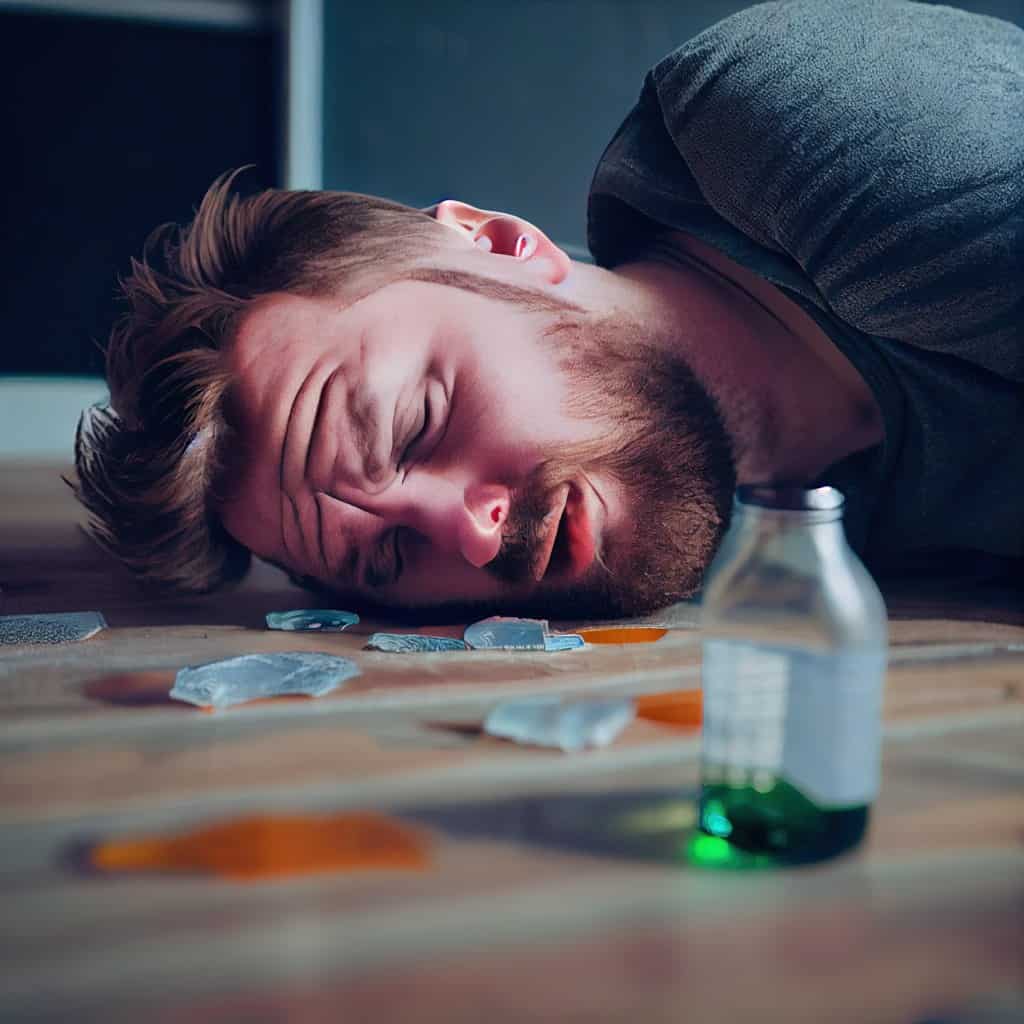Do you find yourself in a never-ending cycle of going out with friends and overindulging in a few too many drinks? Looking to kick that habit and make healthier choices when socializing finally? You’ve come to the right place! This blog will explore tips and strategies to help you break free from binge drinking once and for all!
Why Binge Drinking is a Problem
Binge drinking is a serious and widespread problem, especially among young people. Not only can it be dangerous and lead to harmful situations, but also long-term physical health consequences are associated with excessive drinking. Binge drinking is defined as consuming four or more alcoholic drinks in a short period (generally 2 hours) to become intoxicated quickly.
Statistics on binge drinking show that 25% of adults aged 18 or older in the United States have reported binge drinking within the last three months. It has been linked to health risks such as liver and heart damage, cancer, neurological damage, psychological problems, high blood pressure, stroke, anemia, and reproductive difficulty. Furthermore, people engaging in this behavior are more likely to experience hangovers and other long-term adverse effects from their alcohol consumption.

People need to understand why binge drinking should be avoided and how to stop it for good to prevent serious health complications. With proper knowledge about the dangers associated with excessive alcohol consumption and an understanding of how to identify unhealthy behaviors correctly, it is possible to reduce or abstain from participating in dangerous behaviors like binge drinking.
And let me tell you; I share these tips from personal experience — I used to be a heavy drinker. I would go out with friends every weekend, and everything always seemed overrun by alcohol. It got to a point where I often felt drunk, even when I hadn’t had that much to drink.
Thankfully, I had an epiphany and realized I needed to reduce my drinking. After researching and implementing the tips below, I could quit binge drinking and live healthier.
The Consequences of Binge Drinking
Binge drinking can seriously jeopardize your health and well-being and put you in danger of physical harm. Long-term binge drinking can lead to alcohol-related diseases such as liver damage, heart disease, some types of cancer, memory loss, and other neurological conditions. When done repeatedly over time, it has been linked to an increased risk for depression and anxiety disorders.
It can also harm you; many unintentional injuries occur due to intoxication from drinking. It increases risky behaviors like drinking and driving, which can cause death or permanent injury. Depression among young adults often improves because of heavy episodes of binge drinking. Furthermore, studies have shown that frequent binge drinking contributes to long-term cognitive deficits, as evidenced by significant IQ drops and memory impairment.
It is essential to note the potentially irreversible consequences of chronic or excessive alcohol use. Excessive use destroys mental health, physical health, relationships, and financial stability – which can all be permanently lost due to a progression into alcoholism if the behavior continues unchecked. Seek help if needed; by understanding the risks associated with excessive consumption of any alcohol regularly – you are proactively looking out for your safety and those who care about you.
How to Recognize a Binge Drinking Problem
Recognizing when you have a problem with binge drinking can be difficult. Drinking alcohol is a social activity often involving peer pressure and can be seen as a sign of strength or maturity. But binge drinking is unhealthy and shouldn’t be confused with festive or appropriate consumption. Here are some signs to watch out for that might signal a problem with your drinking habits:
- Drinking more than five alcoholic drinks over a few hours to get drunk
- Feeling ashamed or embarrassed about how much you are drinking
- Skipping meals or other activities to drink
- Being unable to stop once you start
- Inability to remember conversations or events during periods of excessive drinking
- Continued use despite adverse health, personal or professional consequences from drinking
- Inability to recognize when you have had enough to drink
How to Address a Binge Drinking Problem
Binge drinking is defined as consuming a large amount of alcohol in a short period of time to get intoxicated. It carries many risks, including physical harm to the destruction of relationships and long-term health problems such as liver cirrhosis and increased risk for certain cancers. If you or someone you know has an issue with binge drinking, it is important to recognize the problem and take steps toward addressing it. The following tips can be helpful when trying to stop binge drinking:
- Acknowledge the Problem: Admitting that there is a problem you need to address is the first step toward recovery. This may mean sharing your struggle with friends, family, or professionals so they can help support you by providing resources and assistance throughout your journey.
- Develop a Support Network: It is important to have support from friends and family during this difficult process, as they can provide emotional comfort and understanding while developing new habits. They can also provide help if it gets too difficult to manage alone. Additionally, professional services such as therapists and counselors specialize in helping people with addiction issues – sometimes, talking about your problems with someone who understands can help ease stress levels, which might make it easier for you to cope without turning to alcohol.
- Set Limits: Limiting how much alcohol you consume each day or week is an effective way of controlling binge drinking habits so that they do not get out of hand again. Make sure these limits are realistic enough so they don’t become too challenging; starting with something small, like one or two drinks at a time, could also be helpful – every success boosts your confidence!
- Avoid High-Risk Situations: Avoiding events where binge drinking might occur could be beneficial – alcohol-fueled events or places with high volumes of people tend to promote bingeing on booze instead of moderate drinking habits; try setting positive activities during those times instead, such as meeting up with friends for coffee or doing any hobby you enjoy (i.e., yoga classes). It also helps to keep track of triggers that precede binging behaviors and consciously avoid them when possible.
The Importance of Seeking Help
When drinking habits become too much – including drinking on consecutive days, feeling the need to distract yourself with alcohol, or experiencing negative consequences from your drinking – it is essential to reach out and get help. Ignoring the problem is an issue; binge drinking usually occurs as a form of self-medication, not a desire to get drunk or intoxicated. These underlying issues can lead to long-term harm to physical and mental health and relationships with others.
Fortunately, some professionals understand how to navigate these sensitive conversations and pinpoint what can contribute to binge drinking patterns. A professional counselor or psychologist can help you uncover your triggers for alcohol consumption and design a change plan that works for you. You can map out the appropriate therapies and lifestyle changes for healthy sobriety.
Seeking help from those closest to you is also critical during this period of major change, whether it’s friends, family members, or even peers with shared interests who don’t consume alcohol (or maybe consume in moderation). It’s incredibly important to have a positive support system of people with similar values around healthy consumption when trying to make lasting life changes surrounding binges. Suppose parties have been a big part of your life before stopping binge drinking. In that case, spending time in new hobbies such as exercise groups or art classes becomes engaging activities without having the pressure (or temptation!) of participating in all-night events like you were doing before.
Where to Seek Help for Binge Drinking
If you frequently binge drink and consume more than the recommended amount, knowing that help is available is important. If you are struggling with binge drinking and feel you can’t control it or stop drinking entirely, professional help can support and guide you toward healthier behaviors. Here are some options available to get the help you need:
- Primary Care Physician: You may want to consult your primary care physician if you’re concerned about your drinking habits. Your doctor can provide medical advice and support in managing or controlling substance use disorder.
- Mental Health Professional: A mental health professional such as a counselor, psychologist, or social worker can assess for alcohol misuse disorder (AUD) and provide psychotherapeutic interventions for reducing AUD-related harm. They can also provide lifestyle counseling and cognitive behavioral therapy focusing on motivation, relapse prevention, and setting safe limits for consumption.
- Addiction Treatment Center: An addiction treatment center (or rehab center) provides an intense therapeutic environment where individuals receive 24/7 care from specialized clinicians dedicated to helping people combat addiction issues. These programs often include behavioral therapy modalities, family therapy sessions, one-on-one counseling, group discussions, mindfulness activities, and educational classes about addiction and relapse prevention strategies.
- Alcoholics Anonymous (AA): AA meetings can provide a supportive environment for problem drinkers who want to cut down or abstain from drinking altogether through recovery meetings open to anyone who wants to participate in group discussions based on 12-step programs of sobriety maintenance. AA’s goal is abstinence and integration into society as a wholesome individual who can live without alcohol use and abuse affecting daily life decisions.
How to Prevent Relapse
The importance of avoiding relapse after quitting binge drinking cannot be overstated. It can be difficult to break out of old habits, so it is important to have a plan in place to ensure you stay on the right track. Creating healthy habits and routines that don’t involve drinking can decrease the chance of relapse and increase your chances of recovering; here are some tips that may help:
- Identify triggers – Knowing what situations or circumstances trigger your urge to drink (e.g., being around certain people, in certain places, etc.) can help you avoid them and avoid alcohol.
- Create new routines – Replace activities that used to involve drinking with healthier alternatives (e.g., exercise, socializing with friends who don’t drink). Find things that bring you joy, and do them often!
- Stay accountable – Having someone else who regularly checks in with you regarding your progress and sobriety is invaluable. Get an accountability partner who will support you as needed during difficult times.
- Talk about it – Pursue counseling or join a support group like Alcoholics Anonymous (AA) or LifeRing Secular Recovery if possible – seeking help when things get tough is essential for long-term recovery.
It takes effort and commitment, but complete recovery from binge drinking is possible. With dedication, planning, and the right support network filled with healthy activities, anybody can quit their addiction for good.
The Role of Support in Recovery
To achieve long-term sobriety, individuals struggling with addiction must access supportive care that helps them recover. A thorough treatment program should include access to counseling and other helpful resources such as support groups, community programs, and spiritual guidance.
Counseling focuses on identifying the underlying thoughts and behaviors contributing to compulsive drinking. This can help individuals identify their triggers and develop strategies to cope with cravings before they lead to further relapse. Support groups give individuals a safe space to talk openly about their experiences with others recovering from similar struggles. Mutual support among members of these groups can motivate sustained sobriety and help participants build resilience in challenging times.
Community resources such as educational programs, employment opportunities, housing assistance, and family services empower those in recovery by providing positive goals and outlets for growth beyond sober living. Finally, spirituality may benefit some recovering addicts if it becomes an important part of their healing journey. This may include exploring faith-based activities or joining a church or religious organization that provides moral support and emotional guidance for individuals looking for direction in life.
The key is balancing outside sources of help with one’s own inner strength—seeking out therapy sessions, engaging in self-care practices, and establishing a network of supportive friends–all while understanding that each individual’s journey will be unique. Creating a holistic physical and mental health support system makes lasting sobriety achievable–one day at a time.
Tips for Maintaining Sobriety
Establishing sobriety can be challenging; however, with the right support and tips for maintaining sobriety, you can learn how to break the cycle of binge drinking for good. Here are some tips that may be beneficial in achieving your goal:
- Acknowledge Your Trigger Points: Identify the situations that lead to your urge to drink and have a plan in place to manage or avoid these trigger points.
- Analyze Your Drinking Habits: Consider how often and when you drink and if an underlying cause leads you to drink excessively. Knowing what drives your drinking habits will help you develop strategies to manage them more effectively.
- Create a Support Network: Surround yourself with positive influences and talk openly about your abstinence goals so those around you can become part of your recovery team and provide moral support when needed.
- Seek Professional Help: A mental health professional or addiction specialist can provide helpful insight on how to stop binge drinking for good and create a personalized plan tailored to your specific needs and goals of sobriety.
- Develop Healthy Coping Mechanisms: Find alternative ways to cope with stress, such as exercise, journaling, or engaging in hobbies that keep your mind off of drinking, as well as fill any time formerly drinking with healthier activities for both your body and mind.
- Celebrate Small Victories Along The Way: Celebrate each day of sobriety achieved by rewarding yourself with something special while simultaneously recognizing the progress made towards abstinence from alcohol use disorder (AUD).
How to Find Help if You Relapse

If you’ve discovered that your efforts to stop binge drinking have failed, the first step is recognizing that relapse is a normal part of the recovery process. Rather than shame or guilt, accept that you need help and seek professional support. Seeking assistance from a qualified treatment specialist can provide you with evidence-based strategies and techniques for breaking your bingeing habit and managing cravings.
A relapse prevention plan should include medication and cognitive behavioral therapy (CBT), which can help you identify triggers by examining thoughts and feelings related to substance use. Additionally, finding a supportive recovery network of like-minded peers effectively maintains sobriety. Numerous online resources are available where individuals can connect with people recovering from alcohol addiction who provide peer support and encouragement throughout the recovery journey.
Ready To Stop Binge Drinking?
Ultimately, stopping binge drinking starts with recognizing the causes of your habit and understanding that it takes time and effort to make lasting changes in behavior. If you’re ready to take drastic action for yourself or someone else close to you, the following steps will help set up a blueprint for success: seek medical advice; consult with a treatment specialist; attend support groups; identify triggers; develop healthier coping skills; find helpful online resources; consider alternative treatments such as hypnosis or acupuncture; maintain contact with your support system; have patience; know when to seek professional help if needed. With a combination of self-care and professional guidance, sobriety is achievable no matter how hopeless it may seem initially.

